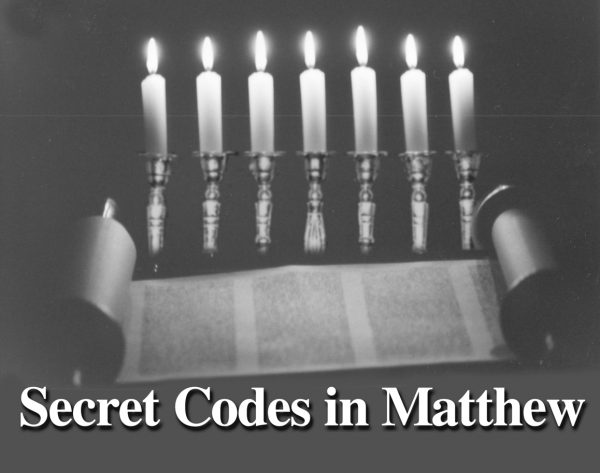The Secret Codes in Matthew: Examining Israel’s Messiah, Part 14: Matthew 17:24-18:16, by Kevin M. Williams
Does Messiah pay taxes? Journey through the Gospel to the Hebrews with Kevin Williams and find out.

And when they had come to Capernaum, those who collected the two-drachma tax came to Peter, and said, “Does your teacher not pay the two-drachma tax? (Matthew 17:24).
Throughout this series, the basic premise has been that the gospel of Matthew was written as a witness, a testimony, of the messiaship of Yeshua (Jesus) of Nazareth. No less is true in the story of the temple tax.
Our companions are in Capernaum, not the temple, so a likely question would be, “why bring up the temple tax here, since they are not even in Jerusalem?” The commandments for the tax in the Torah is the half-shekel, found in Exodus 30:11-16 and summarized later in Exodus 38:26: “a half a shekel according to the shekel of the sanctuary, for each one who passed over to those who were numbered, from twenty years old and upward.” Not long after the gospel story setting, the historian Josephus rewrote this summary from the books of Moses, “He [God] laid a tax upon all the Jews wheresoever they were, namely, two drachmas; commanding everyone . . . to bring it to the Capitol as before they had paid it into the Temple at Jerusalem.”
Therefore a question to be asked about the tax in Capernaum—and not Jerusalem—is not so unusual after all.
In our text however, it appears that Yeshua planned to forego the tax.
“Does your teacher not pay the two-drachma tax?” He said, “Yes.” And when he came into the house, Jesus spoke to him first, saying, “What do you think, Simon? From whom do the kings of the earth collect customs or poll-tax, from their sons or from strangers?” And upon his saying, “From strangers,” Jesus said to him, “Consequently the sons are exempt. But, lest we give them offense, go to the sea, and throw in a hook, and take the first fish that comes up; and when you open its mouth, you will find a stater. Take that and give it to them for you and Me” (Matthew 17:24-27).
Peter’s answer of “yes” may originate from a sense of “don’t be silly, of course he pays the tax.” Perhaps Peter was hoping this was merely an oversight on Yeshua’s part. The text does not really give us an indication.
Yeshua’s answer however, is one that—in not so many words—states that He is the Son of the King—Yahweh, and as such is not required to pay the levy. Nevertheless, Yeshua goes on to say that he—the King’s Son—does not want to offend anyone. This might seem a bit incongruous as many feel Yeshua took every chance he could to offend the Jewish traditions, and these offenses are what earned him so many enemies among the religious and political elite!
Category: Biblical Studies, Pneuma Review, Summer 2004


